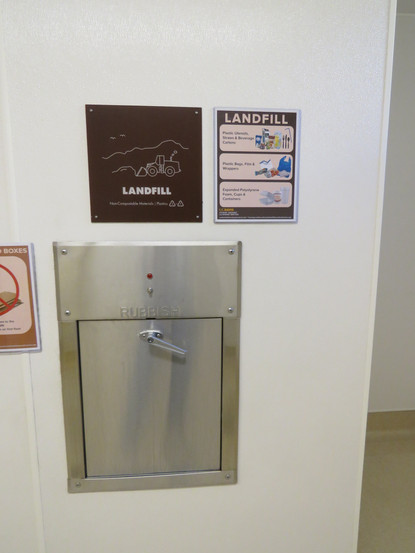Living Sustainably in Student Housing
- Hannah Jenevein

- Oct 13, 2020
- 4 min read
Tips for 1st year Aggies living in the dorms.

Achieving a zero waste lifestyle and thereby producing as little waste as possible requires you to have a certain degree of control over the situations in your everyday life. Choosing to prepare yourself with reusables such as glass jars, travel mugs, silverware, and a reusable bag has a significant personal impact on the reduction of wasteful habits. While living in the dorms on campus continuing with a zero waste lifestyle becomes a bit more challenging. Here are some easy tips to try to avoid or cut down on your waste while living in the dorms!
Tip 1: Relearning how to dispose of your waste

The most important parts about living sustainably must involve being able to responsibly and properly disposing of your waste. In student housing, there are excellent sustainability programs put in place that will make sure you are choosing the most appropriate disposal method and strategy.
Waste containers include:
Electronic waste (Located at the Area Service Desk (ASD))
Textile waste (Located at the ASD)
Non-food Compost (located in all bathrooms)
Everything compost (Yellow Rolling bin located in the trash room)
Recycling (Designated personal recycling bins that can be emptied in the trash room on every floor)
Cardboard recycling (Located at the ASD, and First-floor trash room)
Landfill (Designated personal bins that can be emptied in the trash room)
*There is easy access to these facilities regardless of which dorm you live in*
Tip 2: How to sustainably navigate the Dining Commons

The DC is very good about using reusables such as plates, bowls, cups, utensils etc. and they normally do not allow disposable to-go containers. It is quite easy to fill up a personal travel cup or water bottle with any beverage they are providing that day. In addition to the option to be package free there are also many vegetarian and vegan options which can help decrease the negative impact that regular animal consumption has on the environment. Make sure to look for the items marked with the specific symbols for Vegetation and Vegan dishes.
COVID-19 poses a significant challenge to a low waste lifestyle due to the policies that have been put in place to prevent the spread of the virus. The biggest contributor to this struggle is the use of disposable to-go food containers from the Dining Commons. The large main course containers are made of thick paper and can easily be composted but many things like fruit, cereals, salads, sides, condiments, etc. come in small plastic containers or plastic packaging. In addition to that, all drinks are pre-packaged (such as milk, and some juices) or put into paper cups (which can be recycled/composted), however they all come with a plastic lid. Under normal circumstances being zero waste in the dorms is very possible and highly encouraged.
Because of the recent increase in the use of these disposable to go containers Student housing and Dining Services has created a program with reusable clamshell containers. To use them all you have to do is bring the postcard that was given to you in your mailbox and redeem it for a container and a set of metal silverware. Once you have received it you just bring the dirty container back to the Dining commons at the time of your next meal and place it in a special bin upon entry. You will then receive another ticket for a new container and repeat the process.
Tip 3: Shopping at the Markets

Located near every dining commons there is an Aggie Market. These markets are great for picking up snacks and other essentials on campus. Unfortunately almost everything in these markets have plastic packaging and do not cater to a low waste lifestyle. There is however a counter service where you can get smoothies and warmed sandwiches. These items do have packaging for the most part but the paper bag/tray can be composted. These low waste items are a more sustainable option to a comparable frozen meal.
Tip 4: Low Waste in the Bathrooms

Student Housing has a compost bin in each restroom that allows the disposal of paper hand towels and any other compostable bathroom products such as cotton swabs and cotton balls. A great way to reduce the number of paper towels is to let your hands air dry or bring a small reusable hand towel with you. As far as basic zero waste swaps go, it is recommended to use bamboo toothbrushes, solid shampoo and conditioners, and any other compostables as opposed to items packed in plastic or wasteful materials.
Tip 5: A sustainable Dorm Room



















Comments